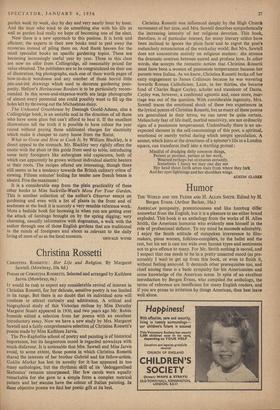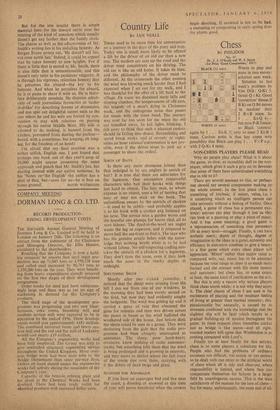Humor
THE WORLD AND THE FLESH AND H. ALLEN SMITH. Edited by ,H. Bergen Evans. (Arthur Barker, 16s.) AMERICAN pomposity, pretentiousness and like humbug differ somewhat from the English, but it is a pleasure to see either brand exploded. This book is an anthology from the works of H. Allen Smith, the American humorist who evidently sees himself in the role of professional deflator. To my mind he succeeds admirably. I enjoy the Smith attitude of outspoken irreverence to film- makers, pious women, folklore-compilers, to the ballet and the rest, but his net is cast too wide over human types and sentiments not to give offence to many. For Mr. Smith nothing is sacred, and I suspect that one needs to be in a pretty unsacred mood (as pre- sumably I was) to get up from this book, or even to finish it, without feeling annoyed. It demands other prerequisites too, and chief among these is a basic sympathy for his Americanism and some knowledge of the American scene. In spite of an excellent introduction by Bergen Evans, who compiled the anthology, the terms of reference are insufficient for many English readers, and if you are prone to irritation by things American, then best leave well alone.
But for the less insular there is ample material here for the inward smile over the relating of the kind of anecdote which usually doesn't get any farther than the family circle. The charm as well as the effectiveness of Mr. Smith's writing lies in his unfailing honesty. As Bergen Evans points out, 'He doesn't tell lies, not even noble lies.' Indeed, it could be argued that he takes honesty to new heights. For if there is little that is sacred to Mr. Smith, there is also little that is unmentionable, and this doesn't only refer to his persistent vulgarity. It is through his vigorous, relentless honesty that he perceives the absurd—the key to his humour. And when he perceives the absurd, he is at pains to share it with us. He is there- fore deliberately unsubtle. He disposes admir- ably of such journalistic favourites as 'cathe- dral-like' for describing forests or mountains, and can spin out delightful scenes such as the one where he and his wife are forced by con- vention to stay with relatives on passing through his native Middle West. His wife is allowed to do nothing, is banned from the kitchen, prevented from dusting the parlour— bored, with a conscience, but longing, oh long- ing. for the freedom of an hotel!
I'm afraid that my final reaction was a rather selfish, English one. I just hoped that perhaps one book out of this year's crop of 20,000 might appear possessing the same approach and punch that Mr. Smith's has, but dealing instead with our native nonsense. In his 'Notes on' the English' the author has a shot at that, but—even for us—he is best on



































 Previous page
Previous page